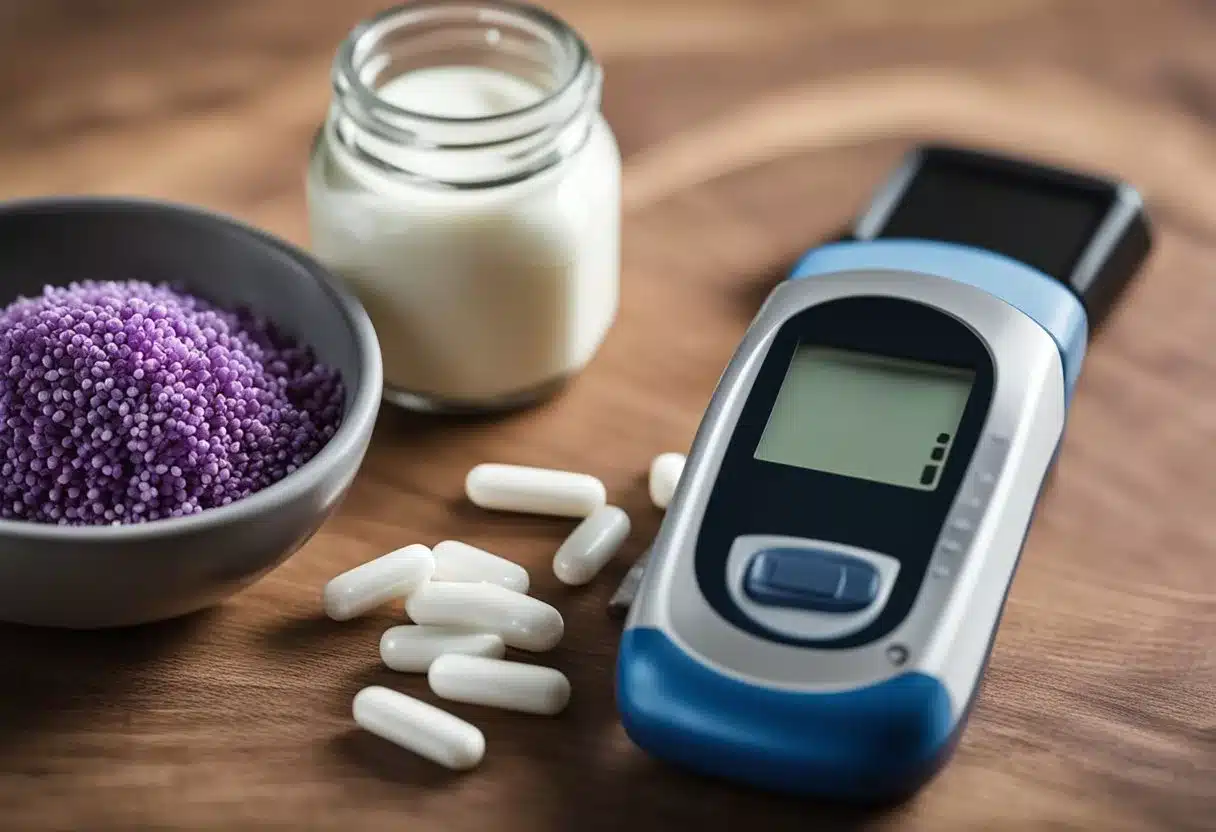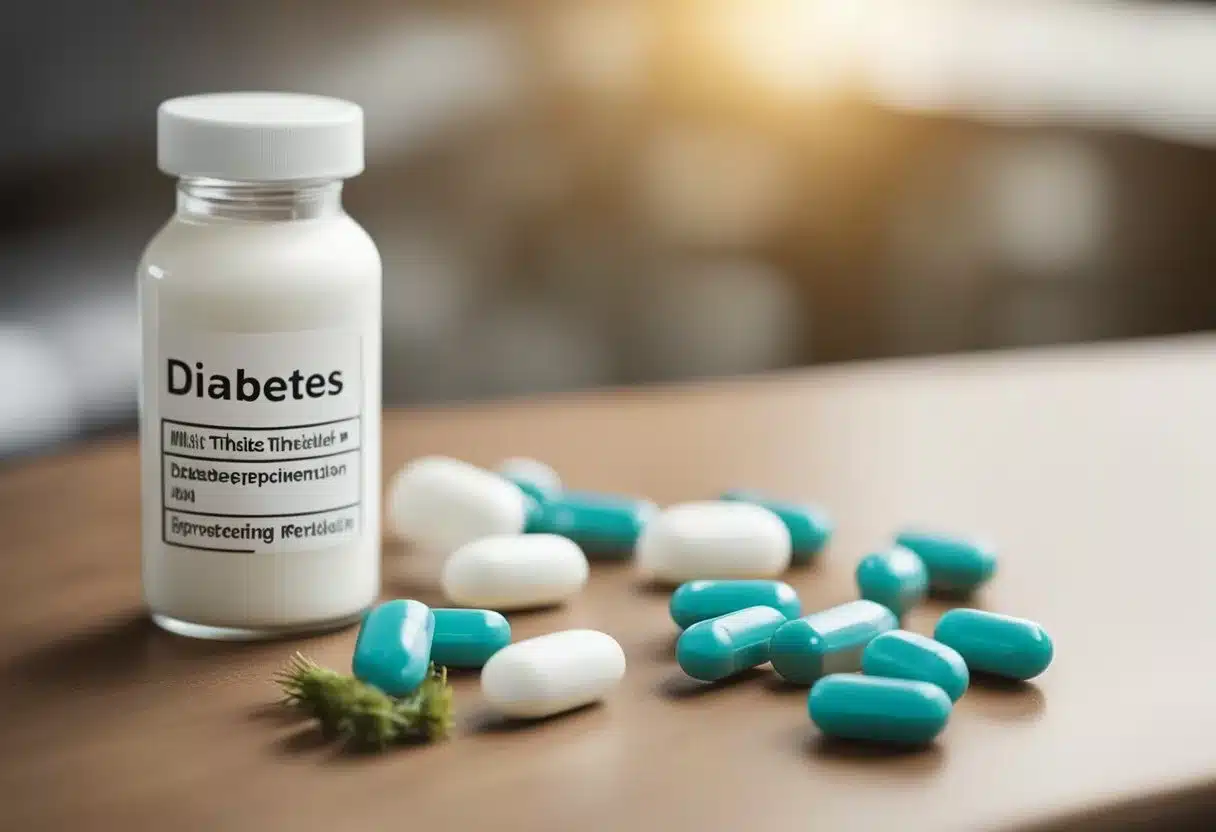Milk thistle has gained attention as a potential supplement for managing diabetes. This herb, known for its liver-protective properties, may offer benefits for people with blood sugar issues. Research suggests milk thistle might improve insulin resistance, a key factor in type 2 diabetes.

Introducing Sugar Defender, an advanced blend of 24 proven ingredients that support healthy glucose levels and natural weight loss.
Some studies have shown promising results for milk thistle in diabetes care. In one trial, people who took milk thistle extract saw improvements in their blood sugar levels. The supplement may help by supporting liver function, which plays a role in blood sugar regulation.
While milk thistle shows promise, it’s not a replacement for standard diabetes treatments. Anyone considering milk thistle should talk to their doctor first. The herb can interact with some medications and may affect blood sugar levels.
Key Takeaways
- Milk thistle may help improve insulin resistance in diabetes
- The supplement supports liver health, which can impact blood sugar control
- Consulting a doctor before taking milk thistle is important due to potential interactions
Understanding Milk Thistle

Milk thistle is a plant with a long history of medicinal use. It contains powerful compounds that may help with diabetes and other health issues. Let’s explore this fascinating herb in more detail.
Botanical Profile
Milk thistle (Silybum marianum) is a flowering plant in the daisy family. It has large purple flowers and shiny green leaves with white veins. The plant can grow up to 6 feet tall.
Milk thistle grows wild in many parts of the world. You can find it in Europe, South America, Africa, Australia, Asia, and North America. In the U.S., it grows in the Eastern United States and California.
The plant gets its name from the milky white sap that comes out when you crush the leaves. People use the seeds to make medicine and supplements.
Historical Use
Milk thistle has been used as a natural remedy for over 2,000 years. Ancient Greeks and Romans used it to treat liver and gallbladder problems.
In the Middle Ages, monks grew milk thistle in their gardens as a medicinal herb. They used it to help with digestive issues and liver health.
Native Americans also used milk thistle. They made tea from the leaves to treat boils and other skin problems.
Today, milk thistle is one of the most popular herbal supplements. People take it for liver health, diabetes, and other conditions.
Active Compounds and Properties
The main active compound in milk thistle is silymarin. Silymarin is a mix of flavonoids that give milk thistle its healing powers. The most important flavonoids are:
- Silybin
- Silydianin
- Silychristin
Silybin (also called silibinin) is the most active part of silymarin. It makes up about 50-70% of silymarin.
Milk thistle has strong antioxidant and anti-inflammatory effects. These properties may help protect cells from damage and reduce swelling in the body.
Research shows milk thistle may also help control blood sugar in people with diabetes. It might make cells more sensitive to insulin and help the liver process sugar better.
Milk Thistle in Diabetes Management

Milk thistle shows promise for helping manage diabetes. It may affect blood sugar levels, insulin function, and other key factors. Studies have looked at its effects in people with diabetes.
Effects on Blood Sugar Levels
Milk thistle may help lower blood sugar in people with type 2 diabetes. Some research found it can reduce fasting blood glucose and HbA1c levels. These are important markers for long-term blood sugar control.
In one study, people taking milk thistle saw their fasting blood sugar drop from 190 mg/dL to 165 mg/dL over 12 months. This was a big improvement compared to the placebo group.
Milk thistle seems to work in a few ways. It may help the body use insulin better. It could also stop the liver from making too much glucose.
Insulin Resistance and Sensitivity
Milk thistle appears to improve how the body responds to insulin. This is key for managing type 2 diabetes.
Research shows milk thistle can increase insulin sensitivity. This means cells take in glucose more easily when insulin is present.
It may also reduce insulin resistance. In insulin resistance, cells don’t respond well to insulin. This makes it hard to control blood sugar.
By helping with these issues, milk thistle could improve diabetes management. It may work alongside other treatments to better control blood sugar.
Clinical Studies and Reviews
Many studies have looked at milk thistle for diabetes. Results have been mixed, but some show real benefits.
A review of clinical trials found milk thistle helped lower blood sugar and HbA1c in people with diabetes. It worked better than placebo in several studies.
One trial tested milk thistle in 60 people with type 2 diabetes. The group taking milk thistle had much better blood sugar control after 4 months.
Researchers think a compound in milk thistle called silymarin is behind these effects. It seems to act like some diabetes drugs, but with fewer side effects.
More large, long-term studies are still needed. But current evidence suggests milk thistle could be a helpful add-on to standard diabetes care.
Liver Health and Detoxification

Milk thistle has shown promise in supporting liver health and aiding detoxification processes. Its active compounds may help protect liver cells and improve liver function in various conditions.
Hepatic Protection and Restoration
Milk thistle contains silymarin, a compound that may shield liver cells from harm. This protective effect can help guard against toxins and promote liver cell regeneration.
Silymarin acts as an antioxidant, reducing free radical damage in the liver. It may also boost the production of glutathione, a key antioxidant in the body.
Studies suggest milk thistle might help restore liver function in people with alcohol-related liver damage. It may also support liver health in those exposed to environmental toxins or certain medications.
Role in Treating Liver Diseases
Milk thistle has been studied for its potential benefits in various liver conditions. Research indicates it may help manage:
- Fatty liver disease
- Alcoholic liver disease
- Drug-induced liver injury
- Viral hepatitis
In cases of hepatitis B and C, milk thistle might help reduce liver inflammation and slow disease progression. Some studies show it may improve quality of life for people with chronic liver diseases.
While results are mixed, milk thistle appears safe for most people with liver disorders. More research is needed to fully understand its effects on different liver diseases.
Impact on Enzyme Levels and Cirrhosis
Milk thistle may influence liver enzyme levels, which can be markers of liver health. Some studies report decreases in enzymes like ALT and AST in people taking milk thistle supplements.
In cirrhosis, milk thistle might help:
- Reduce inflammation
- Slow the progression of fibrosis
- Improve liver function
A few studies suggest milk thistle could extend survival times in people with cirrhosis. However, evidence is limited and more research is needed.
While milk thistle shows promise for liver health, it’s not a cure for liver diseases. People with liver problems should work with their doctor to develop a comprehensive treatment plan.
Safety Profile and Side Effects
Milk thistle is often used as a supplement, but it’s important to know about its safety and potential side effects. Some people may experience mild issues, while others need to be more careful.
Common Adverse Reactions
Milk thistle can cause stomach problems in some people. These include nausea, diarrhea, and bloating. These issues are usually not serious and often go away on their own.
Some users report headaches after taking milk thistle. This side effect is also typically mild.
Itching is another possible reaction. If you notice itchy skin after taking milk thistle, stop using it and talk to a doctor.
Allergies and Sensitivity
People with allergies to certain plants should be careful with milk thistle. It’s part of the same family as daisies, marigolds, and chrysanthemums.
If you’re allergic to ragweed, you might also react to milk thistle. Signs of an allergic reaction can include:
- Rash or hives
- Trouble breathing
- Swelling of the face or throat
If you have any of these symptoms, stop taking milk thistle and get medical help right away.
Contraindications and Warnings
Pregnant or breastfeeding women should avoid milk thistle. There’s not enough research to know if it’s safe for them.
People with diabetes should be careful. Milk thistle might lower blood sugar levels. This could be dangerous if you’re already taking diabetes medicine.
Milk thistle can affect estrogen levels. Women with hormone-sensitive conditions like breast cancer should talk to a doctor before using it.
If you’re taking any medications, check with your doctor before starting milk thistle. It can interact with some drugs and change how they work.
Interactions with Medications

Milk thistle can affect how some drugs work in the body. It may change drug levels or impact blood sugar. People taking medications should be aware of these possible interactions.
Impact on Prescription Drugs
Milk thistle might affect the levels of certain drugs in the body. It can interact with diabetes medications, potentially lowering blood sugar. People with diabetes should monitor their blood sugar closely if taking milk thistle.
The supplement may also interact with:
- Cholesterol medications
- Blood thinners
- Antipsychotic drugs
- Some cancer treatments
Milk thistle could impact the effectiveness of chemotherapy drugs. Patients undergoing cancer treatment should talk to their doctor before using milk thistle.
Over-the-Counter Supplements
Milk thistle may interact with other supplements too. It could affect how the body processes:
- St. John’s Wort
- Iron supplements
- Vitamin E
Milk thistle contains a compound called silymarin. This can bind to other substances, changing how they’re absorbed. Taking milk thistle with phosphatidylcholine may increase its absorption in the body.
Consultation with Healthcare Providers
It’s crucial to talk to a doctor or pharmacist before taking milk thistle. They can review current medications and supplements to check for possible interactions.
A healthcare provider can advise on:
- Safe dosage
- Potential side effects
- Drug interaction risks
For people with diabetes, working with a registered dietitian can help manage diet, medications, and supplements safely. They can provide guidance on using milk thistle as part of a diabetes management plan.
Regular check-ups are important when using milk thistle long-term. This allows for monitoring of any changes in medication effectiveness or side effects.
Additional Health Benefits
Milk thistle offers benefits beyond diabetes management. It contains compounds that may help fight inflammation, protect against cancer, and support heart health.
Anti-inflammatory and Antioxidant Effects
Milk thistle has strong antioxidant properties. It helps neutralize harmful free radicals in the body. This can reduce oxidative stress and inflammation.
The main active compound in milk thistle is silymarin. It fights inflammation in several ways:
- Blocks inflammatory signals in cells
- Reduces production of inflammatory chemicals
- Protects against tissue damage
These effects may help with conditions like:
- Acne
- Arthritis
- Allergies
Milk thistle also supports liver health. It can protect liver cells from toxins and may help treat jaundice.
Potential in Cancer Prevention
Research suggests milk thistle might help prevent certain cancers. Its antioxidant and anti-inflammatory effects play a role.
Milk thistle may:
- Slow cancer cell growth
- Increase death of cancer cells
- Protect healthy cells from damage
Studies have looked at milk thistle for:
- Breast cancer
- Prostate cancer
- Colorectal cancer
More research is needed. But early results are promising.
Milk thistle might also help manage side effects of cancer treatments. It may reduce liver toxicity from some chemotherapy drugs.
Impact on Metabolic and Heart Health
Milk thistle supports overall metabolic health. It may help with:
- Lowering cholesterol
- Reducing blood pressure
- Improving insulin sensitivity
These effects can lower the risk of heart disease.
Some studies show milk thistle may:
- Reduce LDL (bad) cholesterol
- Lower triglyceride levels
- Improve HDL (good) cholesterol
Milk thistle might also help with fatty liver disease. This condition often occurs with metabolic syndrome and diabetes.
The herb’s liver-protective effects may improve overall metabolic function. This can lead to better blood sugar control and heart health.
Guidelines for Supplement Use
Milk thistle supplements require careful consideration for safe and effective use in managing diabetes. Proper dosage, quality selection, and duration of use are key factors to maximize potential benefits.
Dosage and Administration
The recommended milk thistle dosage for diabetes typically ranges from 200-400 mg per day. This amount is often divided into 2-3 doses taken with meals. Some studies have used higher doses up to 600 mg daily.
Start with a lower dose and increase gradually. This helps monitor for any side effects. Always consult a doctor before starting milk thistle, especially if taking diabetes medications.
Milk thistle is available in various forms:
- Capsules
- Tablets
- Liquid extracts
- Teas
Capsules and standardized extracts tend to be most consistent in potency.
Quality and Selection of Supplements
Choose high-quality milk thistle supplements from reputable manufacturers. Look for products standardized to contain 70-80% silymarin, the active compound.
Key factors in selecting a good supplement:
- Third-party testing
- Good Manufacturing Practices (GMP) certification
- Clearly stated silymarin content
- No unnecessary additives or fillers
Avoid supplements with claims that seem too good to be true. Check for potential allergens if you have allergies to plants in the daisy family.
Duration of Use and Efficacy
The optimal duration of milk thistle use for diabetes is not firmly established. Some studies have shown benefits after 3-4 months of regular use.
Milk thistle may take time to show effects. Consistent use is important. Monitor blood sugar levels regularly while taking milk thistle.
Research suggests milk thistle may improve glycemic control in type 2 diabetes. Effects on fasting glucose and HbA1c have been observed in some studies.
Long-term safety data is limited. Consult your doctor about continued use beyond 6-12 months. Stop use and seek medical advice if you experience any unusual symptoms.
Frequently Asked Questions
Milk thistle supplements have shown potential benefits for people with diabetes. Let’s explore some common questions about using milk thistle for managing blood sugar and related health concerns.
What are the potential benefits of taking milk thistle for individuals with diabetes?
Milk thistle may help people with diabetes in a few ways. It could lower blood sugar levels and improve lipid profiles. The supplement’s antioxidant properties might also reduce inflammation linked to diabetes.
Can milk thistle improve insulin sensitivity in people with type 2 diabetes?
Some studies suggest milk thistle may boost insulin sensitivity. This could help the body use insulin more effectively to control blood sugar. More research is needed to confirm these effects.
Are there any specific interactions between milk thistle and diabetes medications?
Milk thistle might interact with some diabetes drugs. It could lower blood sugar, so taking it with diabetes medications may cause blood sugar to drop too low. People with diabetes should talk to their doctor before using milk thistle.
How might milk thistle supplements affect liver health in diabetic patients?
Milk thistle is known for its liver-protective effects. For people with diabetes, who often have a higher risk of liver problems, milk thistle might help support liver function and reduce damage from high blood sugar.
What dosage of milk thistle is considered safe for someone with diabetes?
A typical dose of milk thistle extract ranges from 420 to 600 mg per day, divided into three doses. However, the safe amount can vary based on individual factors. It’s best to consult a healthcare provider for personalized dosage advice.
Is there any research supporting the efficacy of milk thistle in managing diabetes-related symptoms?
Studies have shown promising results for milk thistle in diabetes management. Research indicates it may help reduce blood sugar, correct lipid imbalances, and lower hemoglobin A1C levels. These effects could improve overall diabetes control.
